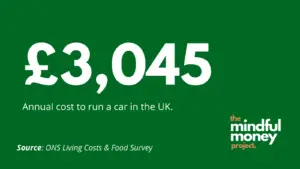If you’re looking to buy a car in the UK, it’s important to be aware of how much it’s going to cost you. There is a range of different costs associated with owning and running a car, from fuel and insurance to tax and repairs. In this article, we’ll take a look at each of these costs and provide an estimate of how much you can expect to pay on average for each one. We’ll also give you some tips on how to reduce your car expenses, even for you young drivers out there!
How Much Does It Cost To Own A Car In The UK
Average Cost To Own And Run A Car In The UK
The average running cost for a car in the UK is £3,045 per year*.

Unsurprisingly, the highest cost is related to acquiring the car, at £1,052 (for example the finance payment, lease payment or outright purchase).
After fuel, the next two highest costs are insurance, £461, and Repairs/Spares, £340.
| Type of Spend | Annual | Monthly | Weekly |
|---|---|---|---|
| Purchase/hire | £1,052.58 | £87.72 | £20.24 |
| Fuel | £935.16 | £77.93 | £17.98 |
| Car Insurance | £461.29 | £38.44 | £8.87 |
| Repairs/spare parts | £339.68 | £28.31 | £6.53 |
| Road tax | £134.19 | £11.18 | £2.58 |
| Parking fees & permits | £41.94 | £3.50 | £0.81 |
| Other fees (e.g. car washing) | £29.35 | £2.45 | £0.56 |
| Consumables (e.g. anti-freeze, air freshener) | £16.77 | £1.40 | £0.33 |
| Breakdown cover (e.g. AA/RAC membership) | £16.77 | £1.40 | £0.33 |
| Driving Lessons | £12.58 | £1.05 | £0.24 |
| Fines | £4.19 | £0.35 | £0.08 |
| Total average running cost | £3,044.52 | £253.73 | £58.55 |
Update: as the table above is based on the Office for National Statistics survey before the current inflationary pressures and cost of living crisis, it is likely some costs (such as fuel) is underestimated.
Even though a view of the average cost is useful as a benchmark, the average hides differences underneath for example your average mileage, usage of the car (i.e personal vs business), where you live (there are differences in insurance based on location) and the type of car you have or want (for example, a sports car is going to cost a lot more to run than a compact city car).
Below is a rundown of the main costs involved in being a car owner in the UK, along with how and where to accurately estimate the total cost of running your car.
Costs Involved In Owning and Running A Car (UK)
There are many car running costs that should be considered, such as:
- leasing or financing payment
- insurance
- car tax
- maintenance and repairs
- MOT costs
- breakdown cover
- fuel
- other car running costs such as parking, fines and consumables like oil
If you are new to driving, you’ll also need to fork out to learn to drive too.
Lease/finance payment
A common route to car ownership is through leasing or car finance. Leasing is when you pay a fixed amount each month for a specified period of time, and at the end of the lease you have the option to lease a new car or you can buy the one you’ve been leasing. With car finance, you buy the car but you finance this with a personal loan.
As both relate to the cost of actually getting hold of the car, this is typically the largest cost in people’s car ownership budgets.
Car Insurance
In the UK, car insurance is mandatory. This helps to protect motorists on the road. Alongside the cost of actually acquiring the car, this is also typically one of the largest costs of car ownership.
Car insurance costs vary greatly based on the car you’re insuring, the type of insurance, the person applying for the insurance (i.e age and driving experience), where you live as well as the expected annual mileage.
You can easily search the market for the best quote using a platform like MoneySuperMarket or GoCompare. Some providers, such as Direct Line, don’t use these platforms so be sure to check them directly too to compare.
Road Tax
Car tax can have quite an impact on the running costs of your car, depending on the model you own. Car tax in the UK scales based on how environmentally friendly your car is.
The tax bands range from £0 all the way up to more than £2,000 a year (for newer cars with high C02 emmissions in the first year). For up to date car tax bands see here.

Maintenance/repair costs
Regular servicing will help to reduce the chance of needing large repairs in the future, as well as make your car easier to sell.
So repair and maintenance costs should be budgeted from the outset.

It would be prudent to also budget this if you’re planning on buying a new car, but sometimes new cars come with warranties from the manufacturer or built-in servicing deals with the dealer, so it’s always worth checking what they cover and what they don’t (make sure you budget for what they don’t).
Generally, you would expect to pay more for repairs and maintenance on an older car.
The average cost of spare parts and repairs is ~£340 in the UK. However, you can expect to budget more if your car is older, and less if your car is younger. As an (anecdotal) example, I bought a 15-year-old Vauxhall Astra and it cost me on average £100 a month (so £1,200 per year) to keep it road-worthy.
MOT
In order for your car to be roadworthy, it needs to pass the MOT test each year (this stands for simply the Ministry of Transport test).
This annual test is used to ensure cars meet certain standards of safety, roadworthiness and also checks the level of exhaust emissions.
The maximum cost of an MOT test is £54.85, so this tends to be a minimal cost. However, if any repairs are recommended that result in the car failing, you’ll need to fork out for the repairs and another test.
Breakdown cover
Breakdown cover means that if you were to break down then a service, such as the AA or RAC, will dispatch a recovery vehicle to repair your vehicle.
Typically if they can’t repair your vehicle at the roadside, they’ll be able to provide a level of onward transport (but be careful to check what is or isn’t included in your cover, as they vary).
Some bank accounts include breakdown cover, so before you go out and buy separate cover it is worth checking with your bank if they do.
Outside of your bank offering cover, you will be able to run a comparison search on MoneySuperMarket, or check the AA or RAC directly for their quotes for your car.
Consumables/Other
Things like oil, air fresheners, cleaning costs/valet costs, parking costs, fines etc. It is worth including in your budgeting, but they tend to be small.
The average cost for consumables and other little costs such as air fresheners and anti-freeze comes to just under £20 per year.

Fuel
Last but certainly not least, is fuel. The cost of fuel will vary depending on the efficiency and type of your vehicle.
The most accurate way to estimate your fuel costs is using this cost calculator from the RAC, using the most up to date fuel prices which you can find in your area here. You can find your car’s fuel efficiency here.

Of course, an electric vehicle will remove the cost of traditional fuel, but you’ll still need to pay for the electricity usage. Depending on whether you are planning to charge at home, out and about and what home tariff you are on will impact the cost of “fuelling” your EV with electricity. EDF has put together a great guide for you to consider the different options.
How To Calculate Your Monthly Running Costs?
To calculate your monthly running costs, sum up your estimates for the following types of costs (all monthly – so if you pay annually just take that figure and divide by 12).
If you are working out the cost of running a car you already own, consider downloading a spend tracker such as Snoopor Money Dashboard (both free).
How Much Does It Cost To Buy A Car In The UK?
The price of new cars vary hugely based on what kind of vehicle you want, but the more common models you see on the road everyday range from between £15,000 to £35,000.
For example, on the lower end you’ll pay £11,245 for a new Dacia Sandero, which is recognised as one of the cheapest new cars in the UK. For more common brands you’ll expect to pay ~£17,000 for a new Ford Fiesta or Vauxhall Corsa, or £26,450 for a new BMW 1 Series (all basic models, OTR price at time of writing).

New cars lose value the minute they have been driven away from the dealership, with depreciation reaching 10-20% in the first year alone. Therefore, budget-savvy buyers may turn to the second-hand market instead.
And they wouldn’t be alone.
According to AutoTrader’s price index, which tracks the cost of a used car over time based on thousands of listings on their platform, the average cost of a used car is now £18,067 (Jan 2022). However, this is no doubt influenced by the pent up demand from the lockdowns and issues with supply for new cars. Pre-pandemic, the average used car cost £12-£14k.
Not all people are able to buy their car outright, and so the financing or leasing cost needs to be factored into the running costs, which we cover in more detail below.
How To Reduce Your Car Costs?
When buying
Ditch the lease or finance payment and pay in cash
One of the largest costs involved in car ownership is either the lease or car finance payment.
If you pay for a car in cash, you then aren’t saddled with this payment every month. The downside of course is that you need the cash upfront, can’t change the car as easily (compared to a lease) and you will likely be able to afford less of a car compared to leasing.
This will have to be a personal decision based on what is important to you, but getting rid of this lease/finance payment can free up hundreds of pounds a month.
Consider running costs when you buy the car
Tax, fuel efficiency and insurance all vary hugely between different car models. Before you commit to a purchase, run a few quick checks to get an idea of the cost of each of these items.
Car tax: if you’re buying a car on Autotrader (a massive used car marketplace) check the “running costs” tab on the listing which will give you this information, or enter the car reg here.
Insurance: run a quick check using the MoneySuperMarket comparison to get a feel for insurance for the different models.
Fuel efficiency: check the fuel efficiency (mpg) on the petrol or diesel model you’re looking at to compare between models. Generally, a more fuel-efficient car will also have a lower level of road tax so provides a double benefit. With a more efficient car, your fuel consumption, and therefore fuel cost, will be lower.
Of course, the quality of electric vehicles are always improving. Buying an electric car could reduce your running costs with lower road tax and better “fuel” efficiency.
Go for a reliable manufacturer
Some car brands are renowned for being reliable workhorses. This means that over the life of the car fewer repairs will be required and therefore smaller car maintenance bills.
Similarly, the more popular brands will have more readily available spare parts, making repairs even cheaper.
Using data from Warranty Wise, an aftermarket warranty provider for cars (who are very well placed to provide this kind of data), have shown some surprising results.
Their survey ranks the most “reliable” brands based on the car’s age, cost of repair, repair time, and the frequency of repairs needed.
The top 3 most reliable brands are:
- Honda
- Lexus
- Toyota
With some expected names in the top 10 such as Ford and Kia.
However, some interesting findings on the least reliable cars, featuring Land Rover, Audi and BMW all in the bottom 10.
As these are higher-end cars, you can intuitively expect the repairs parts to cost more.
How depreciation can hurt you
Depreciation is when the value of your car reduces over time.
Some cars depreciate faster than others, and so knowing which brands/cars hold their value well can mean the cost of ownership reducing over time. A very niche example, but I bought a 15 year old Vauxhall Astra and sold it two years later for the same amount (although granted I had to spend quite a bit on repairs over the two years to keep that value).
Unlike a lot of other research online, ThisIsMoney have put together a useful list of mainstream cars that depreciate the slowest. The premium German brands such as Volkswagen and Mercedes tend to come out on top.
You can reduce the level of depreciation by:
- maintaining the car well i.e with regular servicing
- being conscious of the level of mileage you put on it each year (lower generally means less depreciation)
Without Buying
Refinance (if relevant)
Did you use a car loan/ personal loan to finance your car? If you did, there may be a cheaper rate out there. If there is, you may save money on your monthly payment by refinancing to a lower-rate loan. Although, make sure to read the terms and conditions of your current loan, as any early repayment or cancellation fees may well wipe out any benefit of the lower interest rate. Be sure to check!
Shop around on insurance
Every year, you’ll get a renewal quote from your current provider. These are rarely competitive quotes. Jump onto MoneySuperMarket, enter your details and see if you can get a cheaper quote. It literally takes a few minutes. This can literally save you hundreds of pounds.
Opt for yearly payments
If you have the cash, then opting for an annual insurance payment can save you some cash on your running costs. An analysis by MoneySuperMarket pegs the average saving as around £200 by opting for the annual payment.
Protect your no claims discount
A no claims discount helps signal to a potential insurer that you’re a low-risk prospect. On offer is a discount anywhere from 5%-60% depending on the length of your no-claims and the insurer.
If you move insurers, it is definitely worth trying to protect your previous no claims discount, so it is worth discussing with them before you take it out.
Are you paying double for breakdown cover?
A lot of premium bank accounts (the current accounts you pay a monthly fee for) tend to come with breakdown cover as one of the benefits.
Before you get separate cover, double-check with your current account provider if you have breakdown cover already.
The cost of breakdown cover varies widely, so this could save you anywhere from £20 a year – £100 a year.
Repairs: don’t take your first quote
It is often difficult to know if you’re being ripped off when being quoted for repairs. A service like WhoCanFixMyCar.com helps you compare the market.
It is ideally suited for standard repairs, as opposed to any investigative or unknown problems. For example, if you need to replace your cambelt or brakes, you can provide your car’s details and it will ask local mechanics to provide a quote.
I’ve used the service in the past and not only will it potentially find you the cheapest quote, but you’ll be able to get a sense for what a fair charge for the service is for which you can make your decision.
DIY Maintenance
If you’re into your DIY, then there is no reason why you can’t expand that into your car maintenance and (simple) repairs. Learning how to maintain your car with oil changes, swapping your lights etc, will help to keep your car in good condition outside of its service schedule. A Haynes manual for your car is a useful wealth of information you can lean on.
Improve your driving efficiency
Often overlooked, but the way you drive can impact your running costs. Avoid heavy acceleration and sharp braking. Aim for smooth, gentle acceleration and to read the road ahead of you to avoid lots of stop-starts.
Pump up the tyres
Making sure your car tyres are at the right pressure can help improve the efficiency of your car and reduce your fuel costs. In a survey of motorists, it was the #1 step taken to reduce their running costs. You can see why, it is free and super easy to do. To check your ideal tyre running pressure, consult the writing on the tyre wall (they normally publish the ideal pressure range), or visit the manufacturer’s website.
Earn with the sharing economy
This won’t really reduce your costs, but it will help offset them.
If your car is sat idle for most of the time, then this could be ideal for you. Some digital marketplaces such as Hiyacar or Turo are designed for car owners to put their cars to work for them when they’re not being used. You essentially list your car on their platform to hire out to people looking for affordable car hire.
Hiyacar even has an option to do it all remotely, allowing people who hire your car to access your car via their app.
Both platforms claim you can earn anywhere from £300 – £600 per month doing this, however it is all dependent on your car, its condition, its availability and your location so this can vary widely.
It would be worth trialling, but hiring out your car may increase the wear and tear on your vehicle.
How To Reduce Your Car Running Cost As A Young Driver?
As a young driver, it can sometimes feel like you’re being unfairly targeted. One of the larger expenses will be your insurance costs. Even though it feels like it’s unfair, it all comes down to statistics. Essentially, younger drivers pose a higher risk to car insurance firms than older drivers, and they charge in line with that. Luckily, there are things you can do to bring these costs down.
Black box insurance
A bit of a strange one, but some insurers will reduce your insurance costs if you agree to having a black box fitted to your car. This is essentially a device that objectively monitors your driving. This provides the insurance company more personalised information it can use to assess risk, and as a result tends to reduce your premium payments.
That being said, it is worth reading up on these to see if it is suitable for you. Some providers impose restrictions, such as nighttime driving, which may make it unsuitable for some drivers. CarBuyer has a useful pros and cons round-up here.
Buy a small car
As car insurance costs are all based on risks, if you purchase a car with less power and a smaller engine, your insurance figures will be lower than buying a faster and more powerful car.
When searching for your first car, be sure to get some quotes for a range of cars. You’ll quickly see the difference between different models and can tweak your purchase based on that.
Pass Plus test
Even though the Pass Plus test is not mandatory, it provides additional training for new drivers and may help to reduce the cost of your car insurance premiums.
It provides guided training, helping to boost confidence by tackling some situations such as dual carriageways, motorways, country roads and nighttime driving.
Some local councils even offer up to 50% of the cost of the training, so definitely check out the list to see if you live in one of them.
Not all insurers provide a discount for this, so be sure to check with your insurer that they do. Another quick way of finding this out is by running a car insurance quote on MoneySuperMarket and including/excluding your PassPlus certificate to see if it impacts your main quote. You may find the cheapest quote doesn’t change.
Conclusion
In the UK, the average car costs £3,044 to run per year. As this is an average, it varies massively based on your annual mileage, where you live in the country and the type of car you have purchased.
There are some quick wins in terms of reducing your running costs, such as inflating your tyres to the correct pressure. But keep an eye on the areas where you can make big savings, such as getting multiple quotes for repairs, and comparison shopping for your annual car insurance. These can save significant sums each year from your annual car running costs.
*Methodology and Notes
Source: ONS Living Costs and Food Survey (other sources linked above), National Travel Survey (Department for Transport), Nerd Wallet Car Cost Survey
Methodology: using the data provided by the ONS Living Costs and Food survey, we have provided average cost per household as well as average cost per car. The ONS data is provided as per household, and we have used the Department for Transport’s National Travel Survey to estimate the number of cars per household as 1.24.
Drawbacks to the data: as the ONS data is an average across all households, it dilutes the true cost of ownership as some households don’t own a car.
Disclaimer: information presented in this article was up to date at the time of writing and publication. Even though we hope this article serves as an informative and useful guide to the car running costs in the UK, none of the contents should be construed as advice. Please conduct your own research before taking action.


